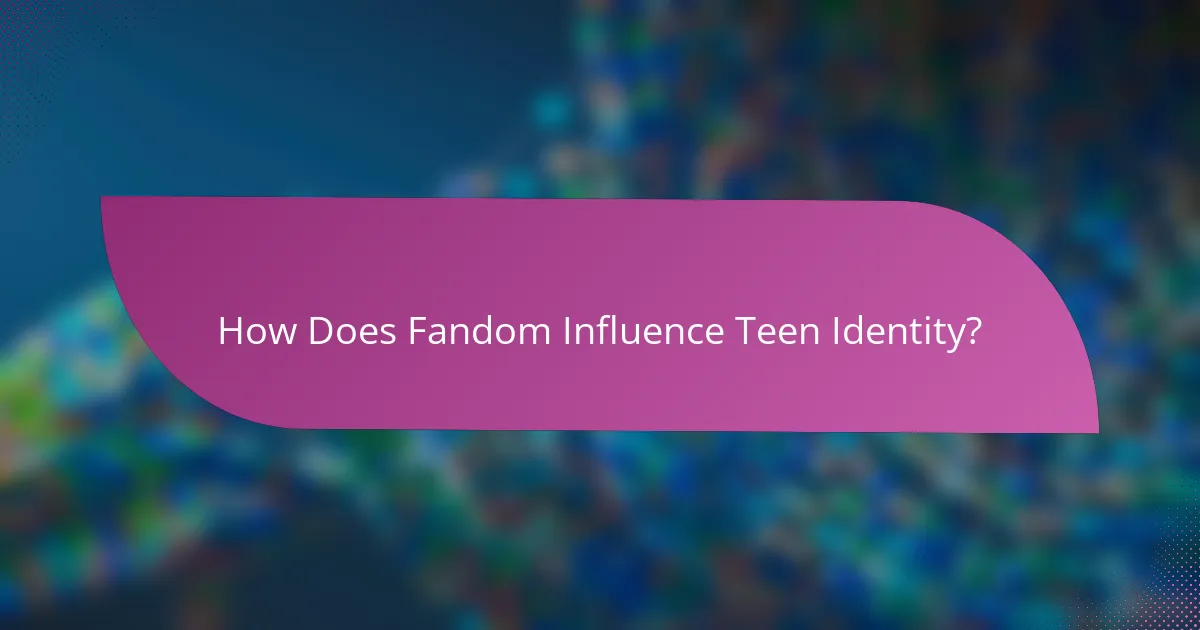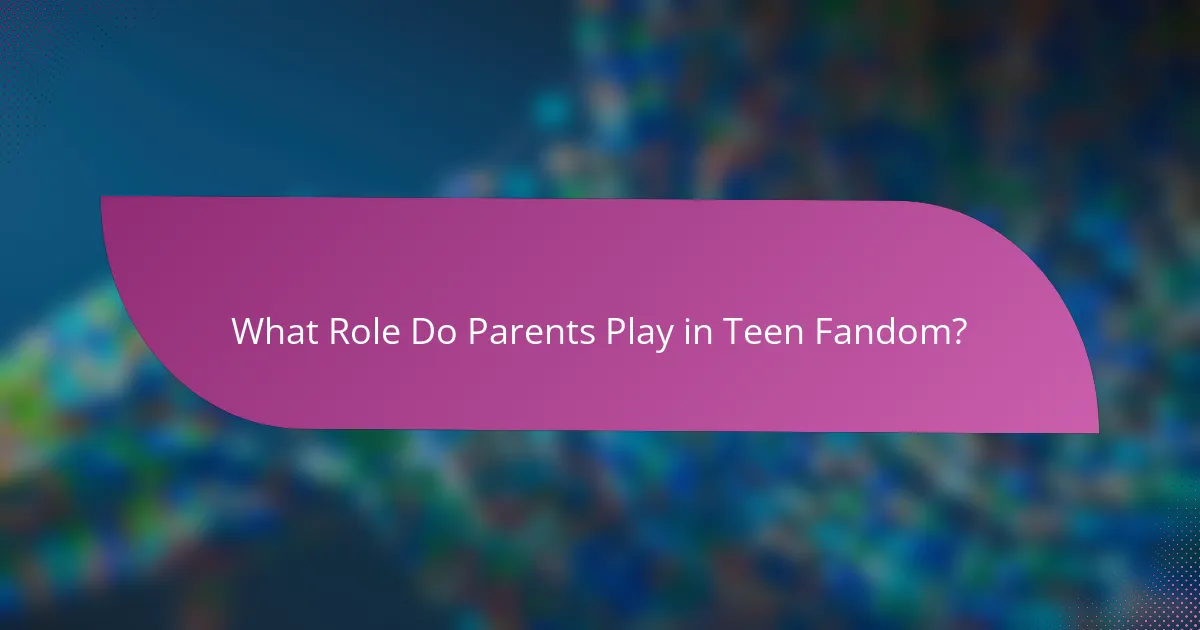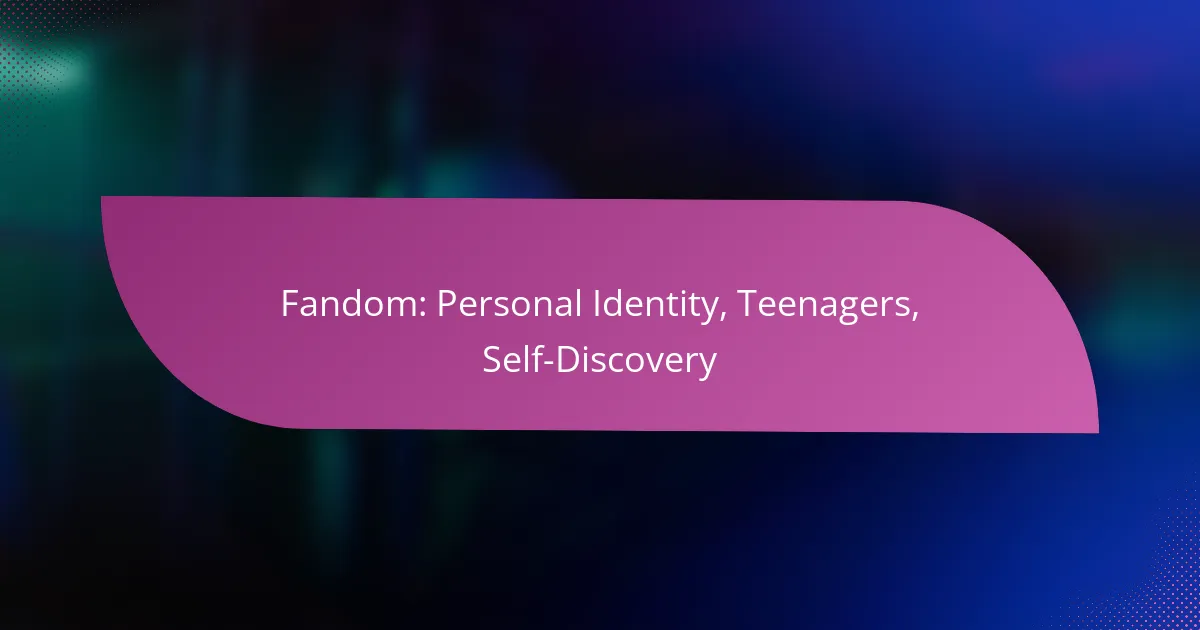Fandom serves as a vital platform for teenagers to explore their identities and express themselves. By engaging with shared interests and communities, they can navigate their values and beliefs, fostering personal growth and a sense of belonging. This unique environment encourages self-discovery, allowing teens to connect with others who share their passions and reflect on their own experiences through the narratives they love.

How Does Fandom Influence Teen Identity?
Fandom plays a significant role in shaping teen identity by providing a framework for self-expression and community belonging. Engaging with fandoms allows teenagers to explore their interests, values, and social connections, which can lead to enhanced self-discovery.
Fandom as a self-expressive tool
Fandom serves as a powerful self-expressive tool for teenagers, enabling them to showcase their interests and personality. Through creative outlets like fan art, fan fiction, and cosplay, teens can articulate their identities in ways that resonate with their passions.
For example, a teenager who is passionate about a particular book series might create artwork or write stories that reflect their interpretation of the characters. This creative expression not only solidifies their connection to the fandom but also fosters a sense of individuality.
Impact on social connections
Fandom can significantly enhance social connections among teenagers by providing common ground for friendships. Engaging in shared interests, such as attending conventions or participating in online forums, allows teens to meet like-minded individuals and build supportive communities.
These connections can lead to lasting friendships, as teens bond over their favorite shows, movies, or games. Additionally, online platforms allow for global interactions, expanding their social circles beyond local boundaries.
Role in self-esteem development
Fandom can positively influence self-esteem development in teenagers by offering validation and acceptance. When teens find communities that celebrate their interests, they often feel more confident in expressing themselves and their identities.
Participating in fandom activities, such as sharing creative works or engaging in discussions, can reinforce a sense of belonging and accomplishment. However, it is essential for teens to navigate fandoms mindfully, avoiding toxic environments that may negatively impact their self-worth.

What Are the Benefits of Fandom for Teenagers?
Fandom offers teenagers a unique space for personal growth, social interaction, and emotional exploration. Engaging with shared interests can foster a sense of belonging and identity during formative years.
Community building
Fandom creates vibrant communities where teenagers can connect with others who share similar interests. These groups often form online through social media platforms or fan forums, allowing for global interaction and local meet-ups.
Participating in fandom communities helps teenagers develop social skills, make friends, and build networks. For example, attending conventions or local fan events can enhance their sense of belonging and provide opportunities for collaboration on projects like fan art or writing.
Creative expression
Fandom encourages teenagers to express themselves creatively through various mediums such as writing, art, and video production. Engaging in these activities allows them to explore their talents and interests while contributing to the community.
For instance, creating fan fiction or fan art not only showcases their skills but also allows them to reinterpret stories and characters in ways that resonate personally. This creative outlet can be empowering and help build confidence in their abilities.
Emotional support
Fandom can provide significant emotional support for teenagers, offering a safe space to discuss feelings and experiences. Many fans find solace in shared narratives that reflect their own struggles, helping them feel less isolated.
Through online discussions and support groups, teenagers can share personal stories and receive encouragement from peers. This connection can be particularly beneficial during challenging times, as it fosters understanding and empathy among fans who relate to each other’s journeys.

How Can Fandom Aid in Self-Discovery?
Fandom can significantly aid in self-discovery by providing a space for individuals to explore their interests, values, and identities. Engaging with fandoms allows teenagers to connect with like-minded peers and reflect on their own beliefs and preferences through the lens of their favorite stories and characters.
Exploration of personal values
Fandom often encourages individuals to examine their personal values by presenting various moral dilemmas and character choices. For instance, a fan of a series that emphasizes friendship and loyalty may find themselves valuing these traits more in their own life. This exploration can lead to a deeper understanding of what truly matters to them.
Participating in discussions or fan theories can also prompt fans to articulate their beliefs and values. Engaging with others who share similar interests can reinforce these values or challenge them, leading to personal growth.
Understanding identity through characters
Characters in fandoms often serve as mirrors for fans, reflecting their own struggles, aspirations, and identities. By identifying with a character’s journey, fans can gain insights into their own lives and experiences. For example, a teenager might resonate with a character who overcomes adversity, prompting them to reflect on their own challenges.
This connection to characters can also foster a sense of belonging. Fans may find comfort in knowing that others relate to their experiences, which can enhance their understanding of their own identity.
Fandom as a reflection of interests
Fandom can reveal personal interests that may not be immediately apparent. By engaging with specific genres or themes, individuals can discover passions they may want to pursue further, such as writing, art, or even activism. For example, a fan of fantasy literature might explore creative writing or role-playing games.
Additionally, fandoms often provide opportunities for community involvement, such as conventions or online forums, where fans can share their interests and talents. This communal aspect can reinforce their hobbies and lead to new friendships based on shared passions.

What Are the Risks of Fandom for Teenagers?
Fandom can pose several risks for teenagers, including excessive escapism, negative peer pressure, and potential impacts on mental health. Understanding these risks is crucial for navigating the complex landscape of personal identity and self-discovery during adolescence.
Excessive escapism
Excessive escapism occurs when teenagers immerse themselves in fandom to the detriment of their real-life responsibilities and relationships. This can lead to neglecting schoolwork, family obligations, and social interactions, as they may prefer the fantasy world over reality.
To mitigate this risk, teens should set boundaries on their fandom activities, such as limiting screen time or scheduling regular breaks. Engaging in diverse hobbies can also help maintain a balanced lifestyle.
Negative peer pressure
Negative peer pressure in fandom can manifest as bullying or exclusion based on one’s interests or level of engagement. Teenagers may feel compelled to conform to group norms, which can lead to unhealthy behaviors or choices, such as spending excessive amounts of money on merchandise.
Encouraging open discussions about fandom can help teens feel more secure in their interests. Parents and guardians should promote a culture of acceptance and understanding, allowing teens to express themselves without fear of judgment.
Impact on mental health
Fandom can significantly impact mental health, with both positive and negative effects. While it can provide a sense of community and belonging, it may also lead to feelings of inadequacy or anxiety, particularly if teens compare themselves to idealized portrayals of characters or other fans.
To support mental well-being, teens should be encouraged to engage in self-reflection and seek professional help if they experience overwhelming feelings. Creating a balance between fandom and real-life interactions is essential for maintaining a healthy mindset.

How to Choose Healthy Fandom Activities?
Choosing healthy fandom activities involves engaging with communities and content that promote positive self-expression and personal growth. It’s essential to find a balance between fandom interests and real-life responsibilities while setting clear boundaries to ensure a fulfilling experience.
Identifying positive communities
Positive fandom communities are those that encourage inclusivity, creativity, and support among members. Look for groups that celebrate diverse perspectives and foster respectful discussions. Online platforms, such as forums or social media groups, can be great places to find like-minded individuals who share your interests.
Consider participating in fandoms that have established guidelines or codes of conduct to maintain a healthy environment. Engaging with communities that prioritize mental well-being can significantly enhance your fandom experience.
Balancing fandom with real life
Maintaining a balance between fandom activities and real-life responsibilities is crucial for overall well-being. Allocate specific time slots for engaging in fandom, ensuring it doesn’t interfere with school, work, or personal relationships. A good rule of thumb is to limit fandom-related activities to a few hours a week, depending on your schedule.
Be mindful of how much time you spend consuming content versus creating or participating in discussions. Strive for a mix of both to keep your engagement fulfilling and productive.
Setting personal boundaries
Establishing personal boundaries is vital for a healthy fandom experience. Determine what aspects of fandom are enjoyable and which may lead to stress or negativity. For example, if certain discussions or content make you uncomfortable, it’s okay to step back or disengage.
Communicate your boundaries clearly with others in your fandom community. This can help foster a respectful environment and ensure that your involvement remains positive and enriching. Regularly reassess your boundaries as your interests and circumstances evolve.

What Role Do Parents Play in Teen Fandom?
Parents play a crucial role in shaping how teenagers engage with fandoms, influencing their interests and social interactions. By providing support and guidance, parents can help teens navigate the complexities of their passions while promoting healthy habits.
Encouraging healthy engagement
Parents can encourage healthy engagement in fandoms by promoting balance and moderation. This may involve setting limits on screen time or encouraging participation in related activities, such as fan art or writing. By fostering a diverse range of interests, parents can help teens develop a well-rounded identity.
Additionally, parents should celebrate their teens’ passions, attending events or conventions together. This involvement can strengthen family bonds and provide opportunities for shared experiences, enhancing the overall enjoyment of fandom.
Monitoring online interactions
Monitoring online interactions is essential for ensuring that teens engage safely within fandom communities. Parents should be aware of the platforms their teens use and the types of content they consume. Open conversations about online safety and privacy can empower teens to make informed decisions.
Encourage teens to share their online experiences with parents, creating a trusting environment. This can help parents identify potential risks, such as cyberbullying or exposure to inappropriate content, allowing for timely intervention when necessary.
Facilitating discussions about interests
Facilitating discussions about fandom interests can help parents connect with their teens on a deeper level. By asking open-ended questions about their favorite shows, characters, or fan theories, parents can encourage critical thinking and self-expression. This dialogue can also help teens articulate their feelings and thoughts about their fandoms.
Parents should actively listen and validate their teens’ interests, even if they may not fully understand them. This support can boost a teen’s confidence and reinforce their sense of identity within the fandom community.
